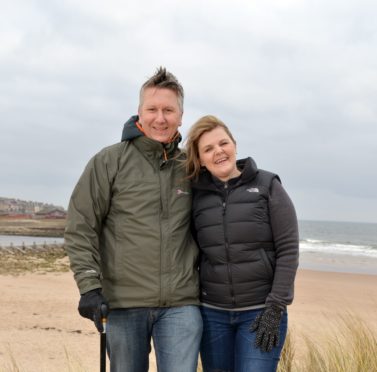A north-east veteran who made the heartbreaking decision to have his foot amputated after stepping on a mine has described the “huge difference” a charity has made to his life.
Corporal Mick McConnell was serving in Afghanistan in 2011 as an RAF dog handler when he stepped on a roadside mine, shattering his left foot.
Five-inch pins were inserted in order to try and keep the limb together.
>> Keep up to date with the latest news with The P&J newsletter
But following two years of rehabilitation and medication the 43-year-old chose to have it amputated in order to ease the pain.
The decision made living in his home at the time almost unbearable.
A loan from the RAF Benevolent Fund allowed Mr McConnell and his wife, Flight Sergeant Lorna McConnell, to buy a more suitable house in Elgin close to family.
The Press and Journal’s Force for Good campaign aims to highlight the work of charities devoted to helping personnel injured in the line of duty.
Mr McConnell has also credited his bomb squad partner, spaniel Memphis who was with him when he was injured in the blast, with aiding his recovery until he died last year.
During his career in the military the dog helped sniff out countless Taliban bombs and was even honoured with a medal after continuing to help his owner keep active.
Mr McConnell said: “Although I was screaming in agony, my first thought was to feel for any major bleeding and see if my arms and legs were still there.
“As I was dragged to safety, I heard Memphis barking – it’s the first time I’d ever heard him bark.”
He added: “The Benevolent Fund helped us to move from a house where it took me 10 minutes to get up and down the stairs.
“We’re now in a home that’s easily accessible and close to family where we can get support.
“It’s made a huge difference to our lives. They’ve lifted an unbelievable weight from my shoulders.”
Last year, the RAF Benevolent Fund spent £18.8million supporting 55,000 people, including personnel and their families.
The charity helps pay for practical, financial and emotional support including mobility aids, training for sick or injured peope leaving the service and awarding grants to veterans living in supported accommodation.
